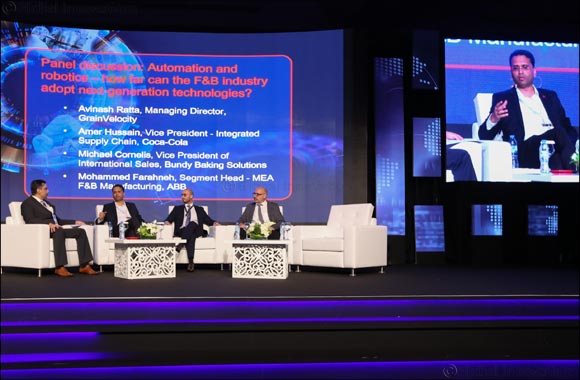
Coca-Cola Puts Extra Fizz Into Its Factory Thanks to Digitisation
High-profile Gulfood Manufacturing 2018 FoodTech Summit reveals how global industry leaders are benefiting from digital transformation
Dubai, UAE – Thursday 8th November, 2018: Digitisation, Artificial Intelligence and next-generation technologies came to the fore on day two of the Gulfood Manufacturing FoodTech Summit, as key industry experts take stage discussing the future and transformation of F&B manufacturing facilities in the region.
The agenda-setting Gulfood Manufacturing FoodTech Summit, running alongside Gulfood Manufacturing at Dubai World Trade Centre (DWTC) this week, brought together international F&B experts, industry leaders and innovators to discuss the global F&B market development and latest solutions with the future in focus, including how to adapt to digital transformation.
Industry pioneers have been taking to the stage during the high-powered, two-day Summit to share knowledge and insights into best practices and efficient use of 4th industrial revolution technology to overcome industry challenges.
While Summit delegates heard throughout the sessions of the need to collect, analyse and utilise data across the entire manufacturing supply chain, global industry leader Coca-Cola revealed how it has invested in digitisation to its advantage.
Amer Hussain, VP, Integrated Supply Chain, Hindustan Coca-Cola, revealed how his plan to automate a bottling plant, based in the Indian state of Gujarat, has had immediate, measurable results in greater efficiency and a reduction of costs – turning the plant into a benchmark for digitisation across the F&B manufacturing sector.
“We are producing 35 million cases a year using two lines and 67 people in the factory,” said Hussain, adding “our aim was to be a lean organisation, be a benchmark of productivity and ensure gender diversity in the workplace.”
Digitising the workplace means Hussain and his team have improved the life expectancy of the plant, increased equipment availability, and improved planning and cost optimization.
“We have gained real-time machine insights and enjoy predictive maintenance and analytics. We have a far more accurate grip on inventory, and have seen an improvement in material yields, with a lean inventory,” added Hussain.
Other benefits enjoyed by the sate-of-the-art factory include real-time energy management, inventory management, stronger and easier management of QSE systems and a holistic view of activity over the fully connected, paperless factory.
The key takeaway from the session was that digitalising operations has resulted in a 30 per cent saving on fixed costs. “This creates a very clear business case for digital transformation,” said the VP, “we are seeing higher volumes at a lower cost.”
But the success came with a caveat. Hussain warned: “In order for a digitisation strategy to succeed, you must have leadership buy-in, and the right team and tools. The benefits only really come in when you have these three things in place.”
In a thought-provoking session on day two, Mike Yesudas, CTO of Watson Customer Engagement Services and Distinguished Engineer at IBM, took to the Summit Stage in a session titled ‘Artificial Intelligence – is it worth your investment?’, which looked at how AI has been introduced across industries and how it can be successfully implemented in the F&B industry.
Yesudas told Summit delegates how AI is fast approaching wide-scale roll-out in everyday business and how the F&B sector must be ready and willing to embrace the “new era”, including data analysis.
“The increase in investment for technology in the food industry is due to the change in consumers habits. The trend of ordering food online has meant that businesses can avoid the overheads involved in dining-in experience and can use data to target consumers directly,” said Yesudas. “Data patterns help identify consumer trends and behaviour that differentiates progressive businesses from the rest. With the advent of AI, food manufacturing units are able to become more lucrative than restaurants in the future.”
Home >> Food Industry Section
Statement by H.E. Ahmad Saeed bin Meshar Al Muhairi SLC Secretary General on Wo ...
MBRU to host Photonics Middle East International Conference – Dubai 2024 from Sa ...
Natuzzi Italia @ Milano Design Week 2024: The Circle Of Harmony – 65th Annivers ...
Ajman Tourism Announces Run Ajman Race at Al Safia Park on 20 April
Ministry of Finance Launches Digital Public Consultation on Potential Implementa ...
Get ready to embark on an unforgettable gastronomical journey at Mercato's Dubai ...
Glam Beaute's Snugberi Launches Exciting New Products to Pamper Your Little Ones
Santoni Presents A Partnership With Patricia Urquiola At The Milan Design Week 2 ...
Superstar Slovenian Tadej Pogaĉar on the hunt for further Monument glory
Tourism leaders from around the world will explore how entrepreneurship and inno ...
Dubai sports council issued a medal to appreciate the first line of defence hero ...
OMODA & JAECOO take global centre stage at Beijing Auto Show 2024
Transform Your Kitchen With Lg's Next-Gen Instaview Oven Designed For The Modern ...
Majid Al Futtaim's 'Feed the Future' Programme Donates 12,000 Meals During Ramad ...
DSMG Wraps Up 2024 Eidiya Campaign with AED 200,000 Cash Prize Bonanza for 22 Wi ...
Kia wins prestigious 2024 Car Design Award for Brand Design Language with ‘Oppo ...
Cleveland Clinic Gastroenterologist Shares Risk-Reduction and Management Strateg ...
The English College Announces Leadership Transition and Reaffirms Commitment to ...
Parmigiani Fleurier – New TORIC Collection
How Not To be Lonely To Be At The Top: The Blueprint for Transformative Leadersh ...
